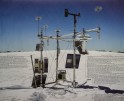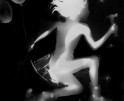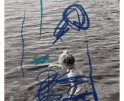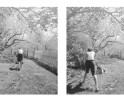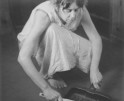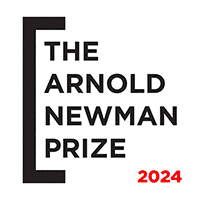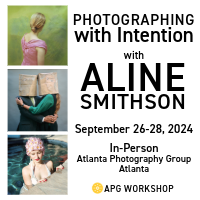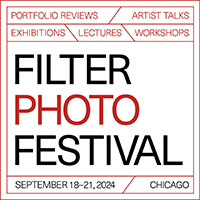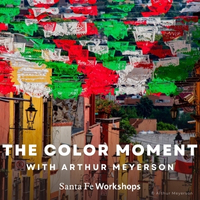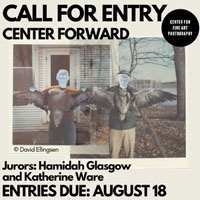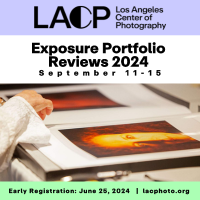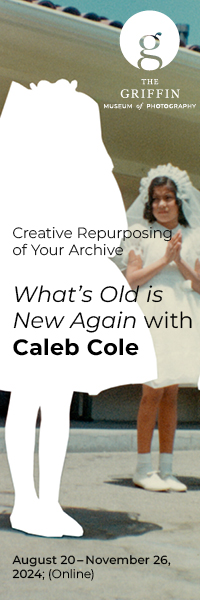Wanted: A World For One Billion
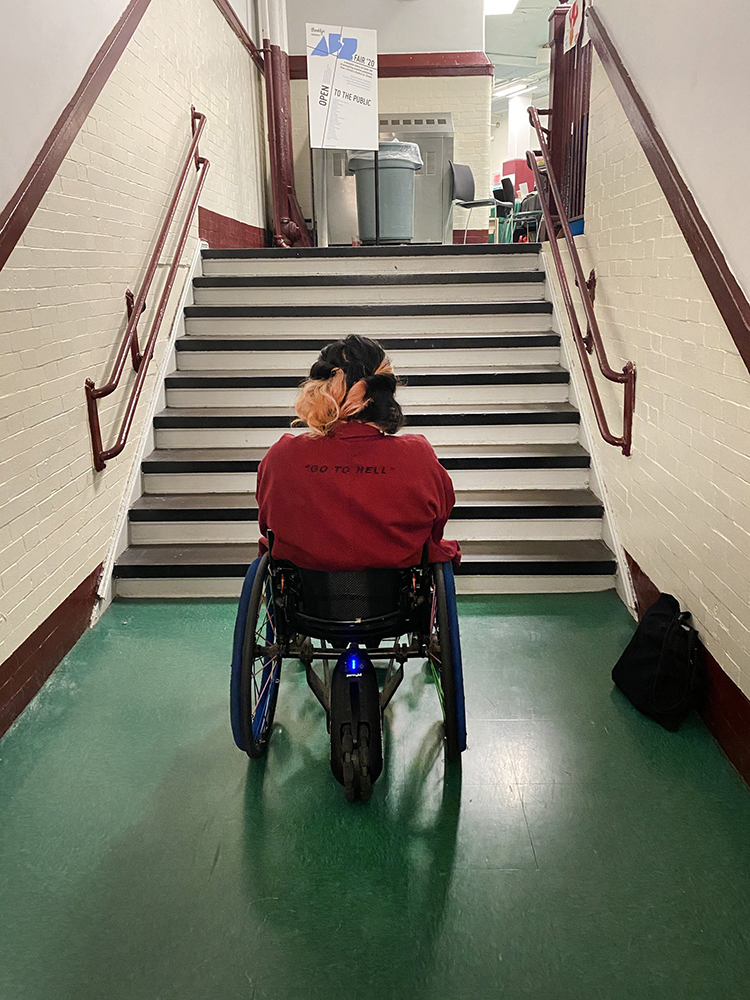
©Jaklin Romine, ACCESS DENIED, Jaklin is sitting her wheelchair with her back to the camera and in front of a set of stairs. At the top of the stairs is a sign with text “Fair ‘20, Open to the Public”. Jaklin is wearing a red shirt with text “Go to Hell” on the back. Her hair is black and light pink.
Wanted: A World For One Billion opened on Dec. 2, 2022, at the United Nations Headquarters in New York. This multi-sensory, accessible, photo exhibit was in honor of the 2022 International Day of Persons with Disabilities which was founded by the U.N. in 1992. It features the work of Lauren Anders Brown, Mbuto Carlos Machili, Megan Bent, Aurora Berger, Frances Bukovsky, Sugandha Gupta, Jaklin Romine and RA Walden and was curated by UNFPA, Photoville and Women Enabled International.
From the exhibition organizers:
The voices on display here are testament to their activism and their voices in the face of ableism, sexism, racism, and other forms of discrimination, expressed through their art. Across multiple formats, these pieces celebrate the rich lives of persons with disabilities, and the agency and strength with which they lead their lives.
Wanted: A World for One Billion showcases the incredible art of national and international creators. From a collection of artists with disabilities and chronically ill artists, to photographers capturing the lives of persons with disabilities in all their diversity, these creators are shining a light on the importance of inclusion. Through personal storytelling, documentary photography, self-portraiture, and depictions of the body, the artwork also highlights the intersections between sexual and reproductive health, bodily autonomy, gender, age, disability, and human rights.
As one of the exhibiting photographers, I was deeply honored to be part of the exhibition. The work I shared is from an ongoing project I Don’t Want To Paint A Silver Lining Around It, which is a personal and political reflection of being high-risk in the ongoing pandemic.
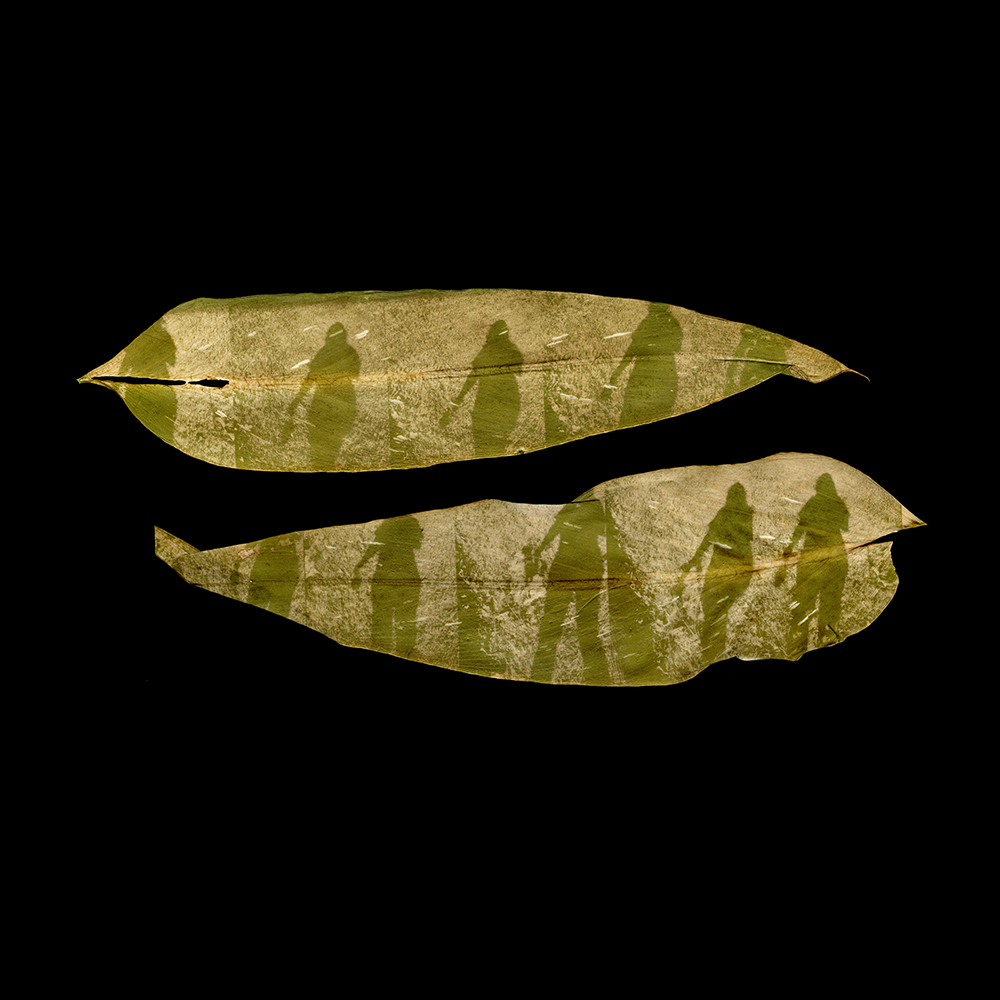
©Megan Bent Quarantine Day 450, 2021, Two calla lily leaves are placed horizontally on a black background. On each leaf, printed in the chlorophyll, is a cascading series of my shadow as I walk.
When I learned what other artists I would be exhibiting alongside I was even more joy-filled and honored to be sharing space with artists whose work I deeply admire. I was also filled with a feeling of connection and community even though I have never met many of these artists.
While the exhibition was on display I had the pleasure to speak more with two of the photographers in the exhibition Frances Bukovsky and Jaklin Romine. I am happy to share more about their photography and practice with you today.
Frances Bukovsky (b. 1996, they/them) is a fine art documentary photographer making work about chronic illness, disability, and queerness in the context of selfhood, relationships, and medical experiences. They utilize self portraiture, documentary style photography, and alternative process prints to understand their dynamic and fluid experience of both illness and gender identity.
Bukovsky earned a BFA with Honors in Photography and Imaging from Ringling College of Art and Design in 2018. Since then, they have been published internationally for their work on chronic illness, including a feature in Archer Magazine’s Disability issue. They have also exhibited work in group shows such as Wanted: A World for One Billion, a UNFPA and Photoville exhibition at the United Nations HQ in NYC, and If We Never Get Better at TILT curated by Sydney Ellison. Bukovsky’s debut monograph, Vessel, was published by Fifth Wheel Press in 2020.
Follow Frances Bukovsky on Instagram: @frances_bukovsky
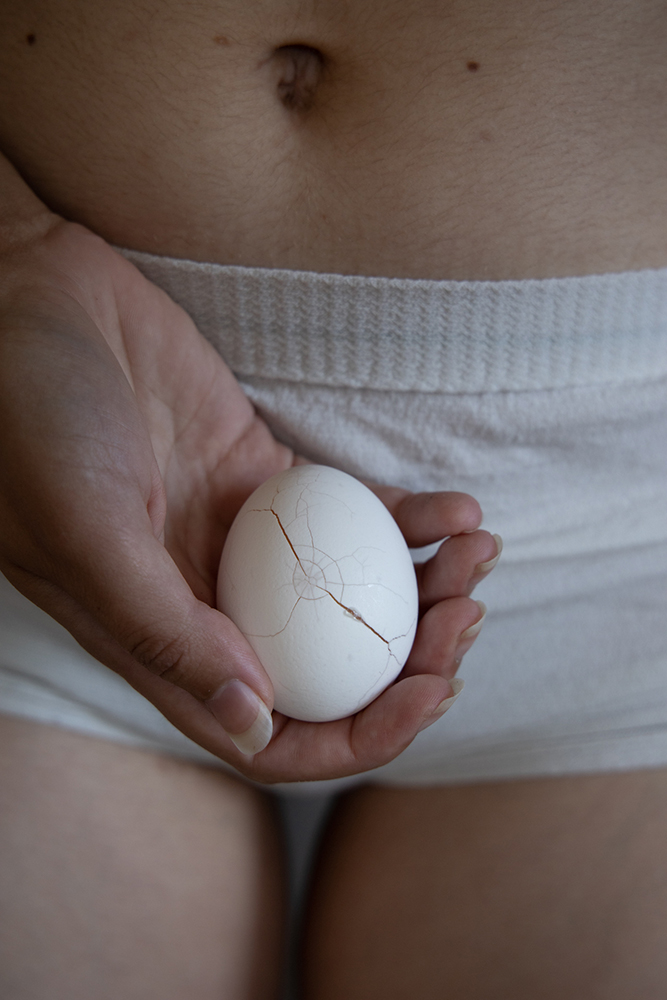
©Frances Bukovsky, Vessel, A close up of a cracked egg cradled by a white hand against the person’s abdomen. They are wearing white mesh hospital underwear.
Bukovsky exhibited work from their project Vessel.
I had a medically necessary hysterectomy when I was 23 after years of misinformed medical treatment. While I recovered, I came out as trans non-binary and started creating self portraiture to explore the newfound acceptance of self that I discovered post-surgery. Photography became integral in my healing process as I used both documentation and symbolism to navigate the turbulent emotions that I was experiencing.
The resulting project, Vessel, exists within this personal context with the goal of creating space to discuss reproductive health and the challenges associated with accessing comprehensive, informed healthcare for people with a uterus. -Frances Bukovsky
The image below is one of the first self portraits I made immediately after surgery. The images I made in the hospital are fascinating to me, as my own memory of the hours after surgery have a vastly different visual tone. The photographs are more attached to the reality of that time than my memory, and somewhere between the two lies my experience. During surgery my reproductive system was almost entirely removed, except for part of an ovary in order to keep me out of surgical menopause. The cracked egg in the final image is representative of my remaining ovary, an organ that continues to make cysts despite its reduced size.
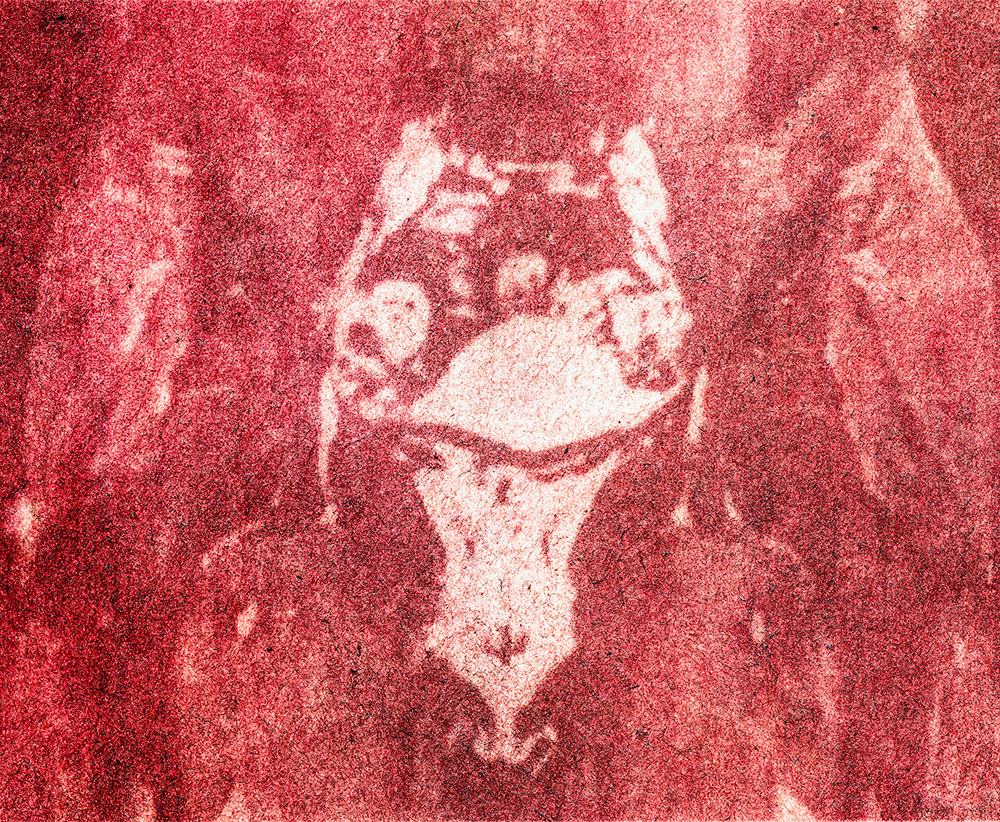
©Frances Bukovsky, Vessel, A bright red and pink image of a pelvis CT scan showing the pelvic anatomy.
MB: Is there anything else you want to share about your work in the exhibition?
FB: The images from Vessel that are included in this show are chronological in many ways. The installation begins with a large print of an anthotype that I created from one of the last scans of my uterus made prior to my hysterectomy. The red print is made with beet juice as the light sensitive emulsion, and beet juice is also present in the next image, an open book on a hospital sheet with red tally marks. The tally marks are all of the days in the year leading up to my hysterectomy in which I experienced menstrual bleeding, equaling over 6 months of that year. Tallying the days seemed important to me in order to convey the immense physical drain my sick reproductive system had on my body and mental well being.
MB: What has being part of this exhibition meant to you?
FB: Being a part of this exhibition has felt incredibly important to me. I started making images about my experience with chronic illness to cope with the intense medical, emotional, and physical experiences that I was going through, and the act of making those images has undeniably been one of the things that saved my life during that time. I never imagined the community that making images would connect me with, and I am so grateful for all of the folks with so many different experiences of chronic illness, disability, and gender identity that I’ve been able to speak with and learn from. This exhibition feels like a global celebration of that community, and I have really treasured the conversations that I’ve had with folks about the work. It is a reminder that art can be a powerful connector, and that as terrifying as being vulnerable can feel sometimes, sharing that vulnerability and coming together as a community can be powerfully transformative.
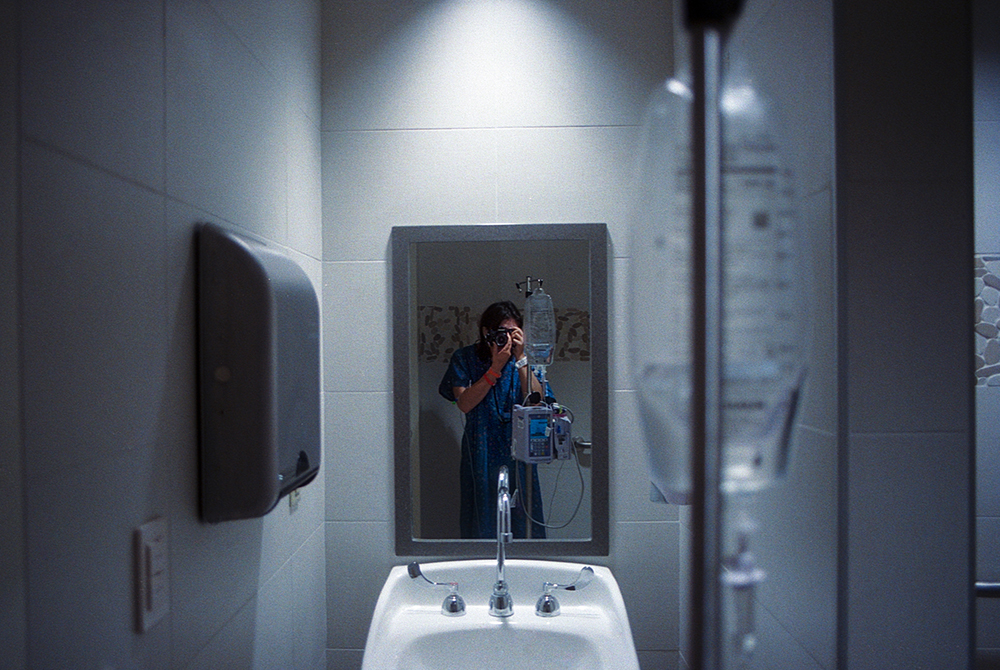
© Frances Bukovsky, Vessel, A dimly lit hospital bathroom bathed in blue light with a person holding a camera to their face in the mirror to photograph themself. They are hooked up to an IV on the right side of the frame and are wearing a blue hospital gown.
Jaklin Romine was born in Burbank, California, and currently lives in Pasadena. She lived in East LA [El Sereno] for 15 years, before that she lived in Echo Park, and grew up in Alhambra/San Gabriel. She studied Studio Arts at Cal State LA, and got her Masters of Fine Art at CalArts . Romine has been working professionally since 2015 and has been exhibiting in multiple group exhibitions across Los Angeles at Los Angeles Municipal Art Gallery, NAVEL, Noysky Projects, Superstition Gallery, One Archives, Night Gallery, Dominique Gallery, Avenue 50 Studio, Gallery 825, Eastside Cafe, Luckman Fine Arts Gallery and in New York at Flux Factory, Gibney Studios, New Women Space. She has lectured on her work at UCLA, NY Film Academy, Chapman University, SCRIPTS College, Torrance Art Museum, Cal Arts, as part of the ArtChangeUS: Arts in a Changing America five year initiative. Her work has been featured in the New York Times, Hyperallergic, Curate LA, KCET, on the cover, centerfold, and contributor of Full Blede and X-TRA. In 2019 she won the Rema Hort Foundation Emerging Artist Grant which assisted her in creating her first solo show, Why Bring Me Flowers When I’m Dead ? When You Had The Time To Do It When I Was Alive/Living With SCI, PSLA, Los Angeles, CA. Then the work from her solo show was curated into group shows at The Wignall Museum, Consulado General de Mexico, SUR Biennial at Rio Hondo College. Simultaneously, Jaklin created a zine from her photographic work and traveled to the Shanghai Art Book Fair, Independent Art Book Fair in LA & NY, Long Beach Zine Fest, San Diego Zine Fest, San Francisco Zine Fest, and Los Angeles Zine Fest. Currently she is working on new photographic and installation work with artist Ginger Quintanilla. (Ginger Q)
Follow Jaklin Romaine on Instagram: @jakioeoeo
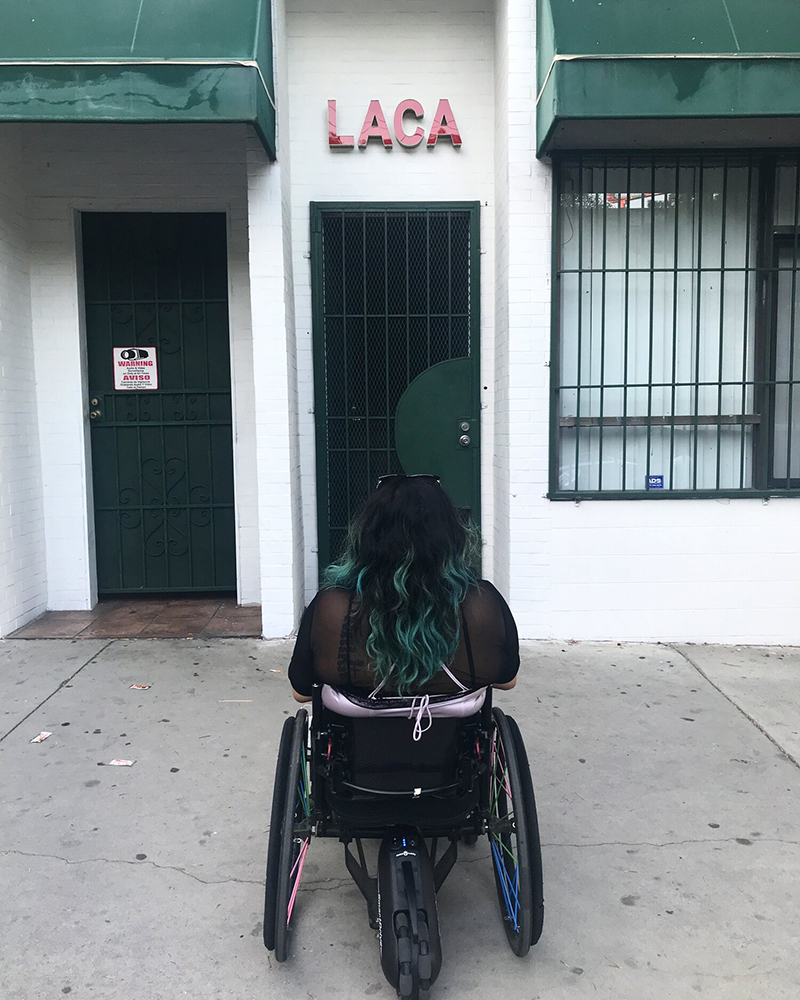
©Jaklin Romine, ACCESS DENIED, Jaklin is seated in her wheelchair, back to the camera, and facing a white building with green doors and awnings. LACA is in red text (Los Angelese Contemporary Archive) at the top of the doorway. Jaklin is wearing a black shirt with a pink tank on top, her black hair is worn down and the tips of her hair are forest green.
Jaklin Romine exhibited their ongoing video piece ACCESS DENIED.
ACCESS DENIED is a working project that deals with inaccessible art spaces around Los Angeles. I am a physically disabled person who has been going to art shows for over 10 years. I have experienced many instances of inaccessibility. After so much exclusion, I could no longer ignore my experience. I decided to make work about my denied access — going to an opening or closing of a show that I’d been invited to, or that I’d seen on social media, or that I had known was inaccessible from prior experience. I would sit outside the gallery and document my performance with help from friends and strangers using video and photos to tell my story. – Jaklin Romine
You can watch the full video of ACCESS DENIED here.
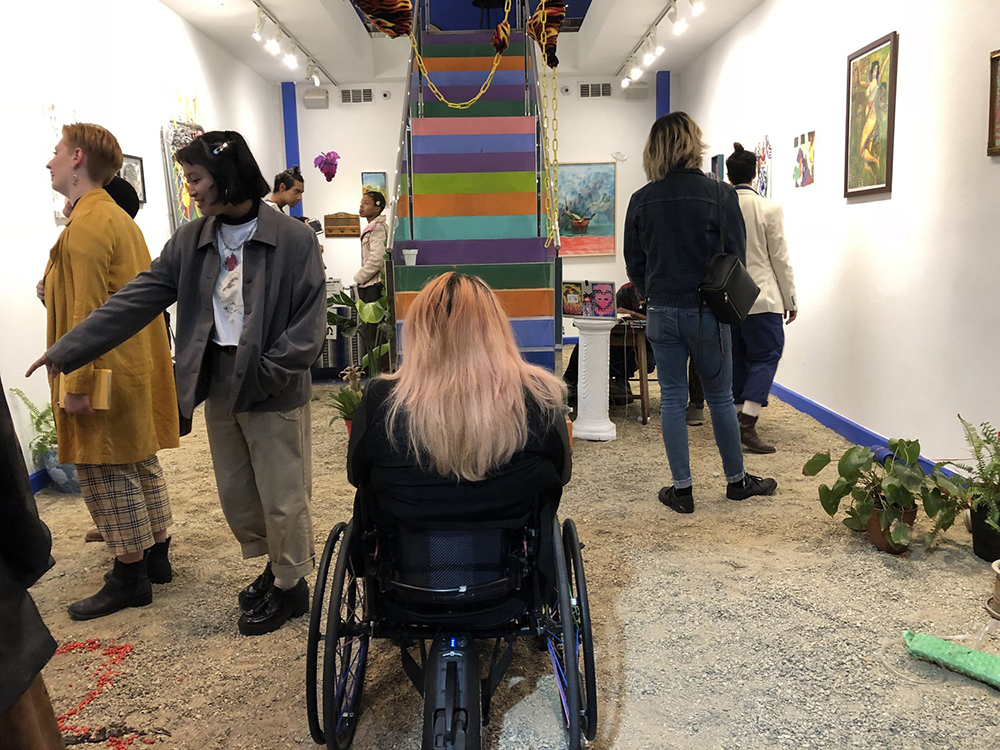
©Jaklin Romine, ACCESS DENIED, Jaklin is seated in her wheelchair, back to the camera and facing a set of brightly colored stairs. As she faces the inaccessible stairs people around her are looking at art on the walls and talking to each other. Jaklins is wearing a black coat and her hairs is worn down and is light pink.
MB: Is there anything else you want to share about your work in the exhibition?
JR: The piece in the show, ACCESS DENIED, started in 2015 and has continued up to now. I don’t ask to make this work. It happens to me not because I want it to or am looking for it. It’s a huge issue for every disabled person, not just me. I am just the one making the work about it.
I have had galleries block me due to this work. Recently people who have been supportive of the project before and helped me take pictures and videos outside of inaccessible galleries are not speaking to me. This is something I didn’t expect from people that I know. This is the first time it has been a personal relationship.”
MB: What has being part of this exhibition meant to you?
JR: I think it’s really amazing. I have consistently been told my work is problematic. I have been told to be more passive, back down, and be more quiet. And now my work is exhibited on an international stage.
If you missed experiencing Wanted: A world For One Billion while it was on view at the U.N. Headquarters in NY, there is an archived webpage of all the artists and their bios on the Photoville website. You can access that here.
Megan Bent is a lens-based artist interested in the malleability of photography and the ways image-making can happen beyond using a traditional camera. This interest started to occur after the diagnosis of a progressive chronic illness. She is drawn to image-making processes that reflect and embrace her disabled experience; especially interdependence, impermanence, care, and slowness.
Her artwork has been exhibited domestically at The Center For Fine Art Photography, Fort Collins, CO; The U.N. Headquarters, NY, NY; The Houston Center for Photography, Houston, TX; form and concept, Santa Fe, NM; The Halide Project, Philadelphia, PA; Flux Factory, Long Island City, NY; El Museo Cultural, Santa Fe, NM; The Foster Gallery, Dedham MA; Soho Photo Gallery, Tribeca, NY; the Austin Central Library Main Gallery, Austin, TX; and abroad at F1963, Busan, South Korea; Alternative Space 298, Pohang, South Korea; Fotonostrum, Barcelona, Spain; and Festival Pil’Ours, St. Gilles Croix de Vie, France.
She has been an artist in residence at Art Beyond Sight’s 2021/2022 Art + Disability Residency, the Nobles School in Dedham, MA, and the Honolulu Museum of Art, HI. She has presented her work at The Common Field 2021 Convening, Atlas Obscura: The Secret Arts, The Pacific Rim International Conference on Disability and Diversity in Honolulu, HI, at Other Bodies: (Self) Representation, Disability and the Media at the University of Westminster in London, U.K., and at Critical Junctures at Emory University in Atlanta, GA. Her work has been featured in Lenscratch, Analog Forever Magazine, Fraction Magazine, Too Tired Project, Rfotofolio, and Float Photography Magazine.
Follow Megan Bent on Instagram: @m_e_g_g_i_e_b
Posts on Lenscratch may not be reproduced without the permission of the Lenscratch staff and the photographer.
Recommended
-
Earth Week: Ian van Coller: Naturalists of the Long NowApril 22nd, 2024
-
Amy Lovera in Conversation with Douglas BreaultJanuary 23rd, 2024
-
Brittany Marcoux in Conversation with Douglas BreaultJanuary 22nd, 2024
-
Penumbra / Image Threads LTP: Adam Meeks and Raymond Meeks in ConversationSeptember 9th, 2023
-
Penumbra Foundation / Image Threads LTP: Again and Again: Ruth Lauer-Manenti and Evan Davis in ConversationSeptember 7th, 2023

